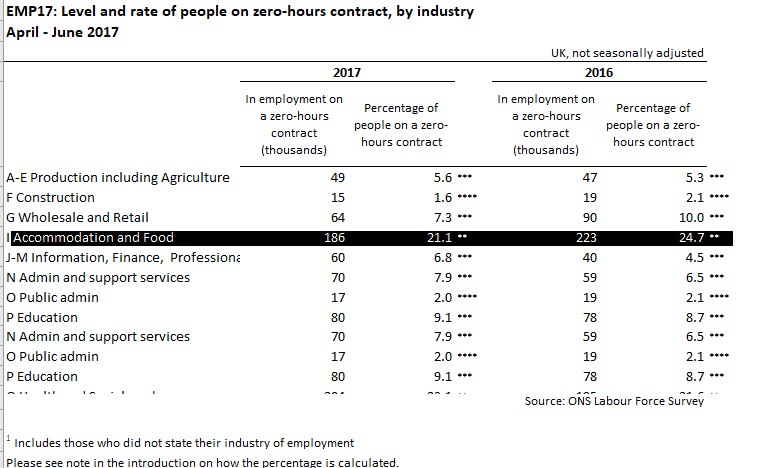From a high of almost 25% of the hospitality sector workforce last year, Zero Hours Contracts appear to be falling in the industry. That’s according to 2017 Labour Force Survey figures on Zero Hours Contracts (ZHCs), which show a fall to 21%.
These figures show ZHCs in the accommodation and food industry have fallen by over 37,000 since 2016, to 186,000. The latest figures are from April to June 2017. The 2016 figures quoted above are not seasonally adjusted, so the comparison is not exact. However, they do represent a significant change.

Zero Hours Contracts in the Hospitality Sector – ONS ZERO HOURS 2016&17
Some commentators say rising employment levels mean that workers can be more demanding about contracts they sign. (Read more here🙂 Whatever the reason, seasonal demand remains a major factor for hospitality. This means ZHCs are likely to remain in the mix for some time.
What are Zero Hours Contracts?
Zero Hours Contracts can loosely refer to various casual agreements between an individual and their employer. But the official Government definition is that ‘generally speaking, a zero hours contract is one in which the employer does not guarantee the individual any hours of work.
A further feature of ZHCs is that ‘the individual can either accept the work offered or decide not take up the offer of work on that occasion’. You can check out the ZHCs guidance for employers from the Department of Business, Energy and Industrial Strategy here
Pros and Cons of Zero Hours Contracts
The CIPD say that “used responsibly, zero-hours contracts can provide flexibility that works for both employers and individuals.” Their own research reports have found that “zero-hours contract employees in the UK are, on average, as satisfied with their jobs as employees as a whole.”
For individual employees, Zero Hours Contracts undoubtedly offer an element of flexibility that is absent from more formal contracts. ZHCs enable them to choose whether or not to accept the hours offered to them. This can give such employees more space and flexibility for their personal lives and other commitments.
For employers, Zero Hours Contracts also offer flexibility – a workforce who can be there for peak demand times only. This particularly suits hospitality sector businesses, such as bars, restaurants and hotels, where busy periods peak at certain times of the day and according to seasonal demand.
The hospitality landscape is one that changes constantly, and high numbers of staff may not be required all year round. Though busy seasons such as Christmas and Summer may require an influx of employees, such an increase may not be required the following month as the seasons rotate.
Arguably then, for hospitality employers, the idea of a zero hours contract sounds ideal. Not only can the individuals themselves choose to turn work down, the same level of flexibility exists for employers too.
Employers are under no obligation to provide any minimum working hours to such individuals. This is particularly helpful for management planning full cover for busy times but with tighter staff budgets outside these times. So, using ZHCs may reduce staffing costs, and specifically may avoid the costs of using agency workers.
However, there are some risks for employers too. ZHCs are essentially an “as and when” arrangement, where there is no mutuality of obligation. So, the very flexibility of the scheme may also reduce the levels of commitment between employer and employee.
The latter issue is perhaps a crucial one. The hospitality industry is often fast-paced and requires a commitment to long and late working hours. Relying on ZHCs could provoke an intake of staff who feel less committed to the business and its high demands. Where such high demands are not met, business may suffer as a result.
Using the kind of good practice guidelines suggested by the CIPD could minimise this risk, however. “Employers should only use zero-hours contracts where the flexibility inherent in these types of arrangement suits both the organisation and the individual”. If it’s mutually beneficial, ZHC workers are more likely to feel as much a part of the team as others.
Zero Hours Contracts issues for employers
Aside from the general Pros and Cons, there are other issues for employers to consider when it comes to ZHCs. These include issues like Holiday Pay – which can be hard to calculate.
Employers also need to consider for Zero Hours Contracts workers, particularly in the light of the latest auto-enrolment legislation. Check out the Hotel Industry UK guidance on these issues here
If you need specialist advice about recruitment or employment issues, just email us on info@FrancesGillespie-HR.com. You can follow us on Twitter @GillespieHR or on Facebook at Frances Gillespie HR

